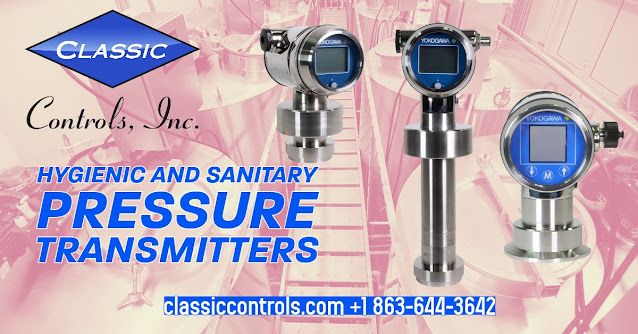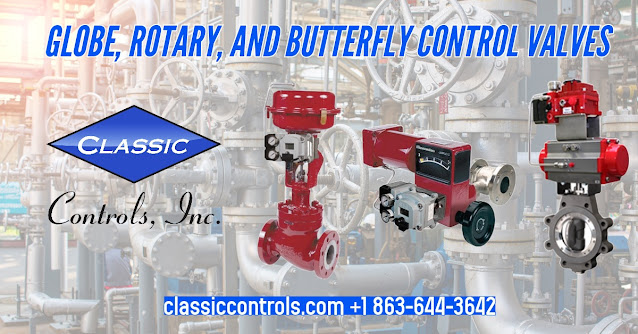An educational blog sponsored by Classic Controls focusing on education and training for the process control, instrumentation, and industrial valve community.
Merry Christmas and Happy New Year from Classic Controls!
Revolutionizing Process Management: The Role of Digitalization in Enhancing Industrial Valve and Instrumentation Operations
- Internet of Things (IoT): Sensors and devices interconnected over the internet, providing real-time data.
- Big Data Analytics: Analyzing large volumes of data for insights to optimize processes.
- Artificial Intelligence and Machine Learning: Intelligent systems that learn from data and improve decision-making.
- Cloud Computing: Remote servers store and process data, providing scalability and flexibility.
- Cyber-Physical Systems (CPS): Integration of physical processes with computer-based algorithms.
- Additive Manufacturing: 3D printing technologies for creating components.
Impact on Industrial Valves
- Real-time Monitoring: Enhanced capabilities for monitoring valve conditions, predicting maintenance needs, and avoiding unscheduled downtimes.
- Automated Control: Valves can automatically adjust based on real-time data, optimizing flow and reducing human intervention.
- Predictive Maintenance: AI algorithms analyze data to predict valve failures before they occur.
- Energy Efficiency: Optimizing valve operations to reduce energy consumption in processes.
Changes in Process Control Instrumentation
- Enhanced Data Accuracy: Digital instruments provide more precise and reliable data.
- Remote Monitoring and Control: Operators can monitor and adjust processes from remote locations, enhancing flexibility and safety.
- Integration with Control Systems: Seamless integration with advanced control systems for more efficient process management.
- Predictive Analytics: Use data analytics to foresee potential issues and optimize process parameters.
Challenges and Opportunities
While factory digitalization offers numerous benefits, it also presents challenges:- Cybersecurity: Increased digitalization heightens the risk of cyber attacks.
- Skilled Workforce: There's a growing need for a workforce skilled in digital technologies.
- Investment Costs: Initial investment in digital technologies can be high.
- Increased Efficiency and Productivity: Automation and data analytics lead to more efficient operations.
- Enhanced Quality Control: Better monitoring and control improve product quality.
- Sustainability: Digitalization can lead to more sustainable manufacturing practices.
+1 863-644-3642
https://classiccontrols.com
Minimizing Risks in Critical Applications: The Irreplaceable Role of Electro-Mechanical Pressure and Temperature Switches
- Unparalleled Robustness and Reliability: Electro-mechanical switches have been tried and tested across decades of industrial usage. They're known for their durability and ability to operate reliably even under challenging conditions, such as extreme temperatures or corrosive environments. Digital sensors, while continually improving, may sometimes be more susceptible to certain types of interference, malfunctions, or even cyber-attacks.
- Simplified Operation and Maintenance: The design of these switches is generally straightforward, making it easier for technicians, even with basic training, to understand, operate, and maintain them. In contrast, more sophisticated digital systems often require specialized knowledge, regular firmware updates, or specific software tools for diagnostics.
- Cost-Effectiveness: Electro-mechanical switches typically have a lower upfront cost compared to advanced digital counterparts. When factoring in the longevity and minimal maintenance expenses, their total cost of ownership often proves advantageous for many businesses, especially those with tight budget constraints.
- Direct Feedback Mechanisms: One of the essential features of these switches is the tactile feedback they provide. Operators can directly feel or hear a switch actuating, immediately confirming a process state. This direct feedback is sometimes missing in digital systems, where a sensor's state might only be viewable via a software interface.
- Reduced Complexity Equals Fewer Failure Points: By their very nature, electro-mechanical systems tend to be less complex than their digital counterparts. Fewer components and more straightforward operation mean fewer points where something could go wrong, leading to increased operational stability.
- Proven Track Record in Critical Applications: Many industries have processes where failure can lead to severe consequences, either in terms of safety or financial loss. In such critical applications, tried-and-tested electro-mechanical switches often become the default choice with their long-standing performance record.
- Immunity to Cyber Threats: In a world increasingly wary of cyber threats, electro-mechanical switches offer an inherent security advantage: they're immune to hacking. Digital sensors and systems, unless adequately secured, can be vulnerable to external threats, potentially leading to malfunctions or data breaches.
+1 863-644-3642
https://classiccontrols.com
Hygienic and Sanitary Pressure Transmitters in Food, Beverage, and Pharmaceutical Industries
(863) 644-3642
https://classiccontrols.com
Globe, Rotary, and Butterfly Control Valves
Globe Style Control Valves
These have a linear motion and use a movable disk-type element and a stationary ring seat in a spherical body. The disk can be moved away from the seat (to open) or towards the seat (to close) to regulate the flow.
- Precise control: They are well known for their accurate throttling capabilities.
- Good shut-off capability.
- Wide rangeability (the range of flow rates over which the valve can effectively control).
- Higher pressure drop compared to other types of valves.
- Bulky design and requires more space.
- Suitable for most processes where precise control is needed.
- Often used in extreme temperature and pressure applications.
Rotary Control Valves
These valves rotate a disk or ball, with or without a shaft, within the flow stream to control flow. Common examples include ball valves, v-notch ball valves, and eccentric disk valves.
- Compact design.
- Lower pressure drops compared to globe valves.
- Quick response and faster actuation compared to globe valves.
- Good rangeability.
- Less precise control compared to globe valves in some applications.
- Might not provide as tight shut-off as globe valves.
- Suitable for applications where quick actuation or less pressure drop is crucial.
- Often used for on/off services or in applications where the media might cause obstruction in other types of valves.
Butterfly Control Valves
Consists of a circular disc or plate built onto a rod. When the rod is turned, the disc turns at a right angle to the flow, acting like a dam to stop or start the flow.
- Extremely compact design.
- Economical, especially for larger sizes.
- Low pressure drop.
- Suitable for slurry applications or services with suspended particles.
- Not as precise as globe valves for control.
- Might not offer a tight shut-off in certain designs.
- Rangeability is often less than globe or some rotary valves.
- Used in cooling water systems, air/gas compressors, and industrial HVAC systems.
- Suitable for applications where tight shut-off isn't critical and where space or cost is a concern.
From South Georgia and Florida, to the Caribbean and Beyond: How Classic Controls Leads in Automation, Industrial Valves and Process Instrumentation
CARILEC Engineering and Procurement Conference 2023
Empowering the Greater Caribbean Market with Premier Industrial Solutions and Unmatched Service
Understanding of the Caribbean and Greater Caribbean Market
Relevance of Associations and Memberships
SEOGS (Suriname Energy, Oil and Gas Summit) 2023
A Look Down the Road at Industrial Valve Automation
Industrial valve automation is a vital component of the broader industrial automation field, constantly redefined by technological advancements and digitization. This area is witnessing significant changes due to a combination of trends that include digital transformation, the Industrial Internet of Things (IIoT), machine learning, artificial intelligence, advanced materials science, and regulatory changes in major industrial sectors like oil and gas, power generation, chemical, mining, and water treatment. Let's delve into the future direction of industrial valve automation.
- IIoT and Connectivity: Industrial Internet of Things (IIoT) refers to the application of IoT technologies in industrial settings. IIoT can help improve valve performance, maintenance, and operation by delivering real-time data and remote monitoring capabilities. Advanced sensors connected to valves can provide information such as temperature, pressure, flow rate, and position status. This data can then be sent to centralized systems or cloud-based platforms for analysis, enhancing predictive maintenance and reducing unexpected failures or shutdowns.
- Artificial Intelligence (AI) and Machine Learning (ML): AI and ML will soon play a critical role in transforming industrial valve automation. AI algorithms can analyze valve data to optimize performance, predict maintenance needs, identify potential failures before they occur, significantly reduce downtime and maintenance costs, improve safety, and increase overall efficiency.
- Advanced Material Science: Ongoing research in advanced materials, including composites and specialized alloys, produces more durable, efficient, and versatile valves. These new materials can withstand harsh industrial environments, prolong valve lifespans, reduce maintenance requirements, and enhance operational performance.
- 3D Printing: Also known as additive manufacturing, 3D printing offers new valve design and production possibilities, handy for producing custom or low-volume valves, where traditional manufacturing methods might be prohibitively expensive or time-consuming.
- Smart Valves: The concept of smart valves integrates sophisticated sensors, advanced materials, and wireless technology. These valves can self-diagnose issues and communicate their status in real time, providing operators with valuable insights and helping reduce unexpected failures.
- Automation and Robotics: Robotic automation is crucial to manufacturing and maintaining valves. This trend not only increases efficiency and productivity but also reduces human errors and increases safety by reducing the need for humans to work in hazardous environments.
- Regulatory Changes: Growing environmental concerns and stricter safety standards are compelling industries to adopt advanced, more efficient, and safer valve technologies, including low-emission valves and technologies that help minimize leakage and wastage.
- Cybersecurity: As valve systems become more digital and connected, the importance of cybersecurity increases. Protecting these systems from potential threats that could disrupt operations or compromise safety is vital.
Digital transformation and advanced technologies will primarily drive the future of industrial valve automation, making it smarter, more efficient, and more connected. However, it is also essential to consider the potential challenges these technologies may bring, such as increased complexity, the need for skilled personnel, and cybersecurity risks. As technology evolves, companies must adapt and implement strategies to leverage these advancements while managing these risks effectively.
https://classiccontrols.com
+1 863-644-3642














